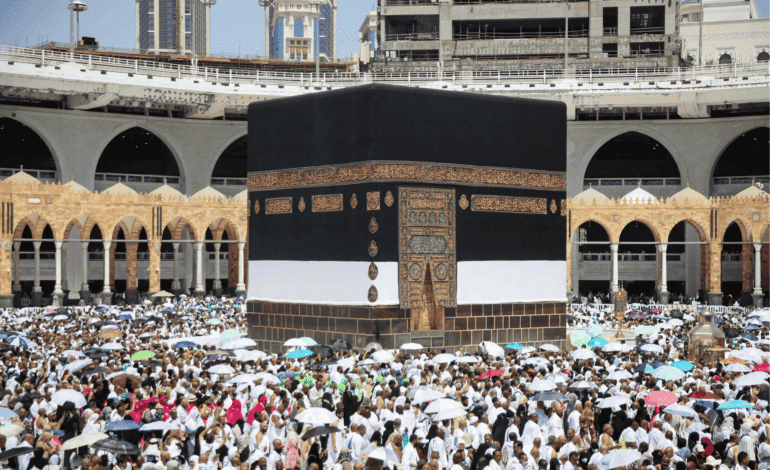UAE Imposes Dhs50,000 Fine for Unauthorized Hajj Pilgrims

Every year, millions of Muslims around the world embark on the sacred pilgrimage of Hajj to the holy sites in Saudi Arabia. For UAE citizens, the General Authority of Islamic Affairs, Endowments and Zakat (Awqaf) plays a pivotal role in regulating and facilitating this important religious duty. Recently, the Awqaf reaffirmed its commitment to safeguarding pilgrims by implementing a strict fine of Dhs50,000 on any UAE citizen who travels to Saudi Arabia to perform Hajj without securing a valid permit approved by the authority.
This announcement comes as part of a broader initiative to ensure that every pilgrim enjoys a secure, well-organized, and spiritually fulfilling Hajj season. By imposing these fines and reinforcing permit regulations, the Awqaf is addressing longstanding challenges associated with unlicensed pilgrims and aiming to enhance the overall pilgrimage experience for the UAE’s faithful.
The Importance of Official Hajj Permits and Compliance
Hajj is not only a spiritual journey but also a massive logistical operation involving millions of pilgrims. To maintain order, safety, and fairness, the UAE government requires all citizens intending to perform Hajj to apply for an official permit issued by the Awqaf. These permits are granted based on clear criteria and governed by cabinet decisions that standardize the Hajj procedures.
The issuance of permits is managed through advanced electronic screening programs that ensure transparency and equitable distribution of pilgrimage slots. This methodical process prevents overcrowding and confusion, enabling authorities to deliver necessary services efficiently. Permits are essential for both male and female pilgrims, affirming that every participant is accounted for and eligible.
Addressing the Challenges of Unlicensed Pilgrims
One of the major challenges that the Awqaf faces annually is the presence of unlicensed pilgrims who attempt to join the Hajj without official approval. These individuals often approach the UAE pilgrims’ headquarters and disrupt the systematic planning and execution of services. Their unregulated presence can cause congestion, delays, and administrative burdens, which ultimately affect the quality of the pilgrimage experience for all participants.
To counter this issue, the Awqaf has implemented strict penalties, including the significant fine of Dhs50,000 for violators. This penalty serves as a deterrent and a reminder of the importance of following official channels. The authority also emphasizes that anyone who disregards the regulations will bear full responsibility for the consequences, including financial and legal liabilities.
The Role of the Awqaf in Facilitating Pilgrimage Services
The General Authority of Islamic Affairs, Endowments and Zakat holds a critical role in coordinating the Hajj journey for UAE citizens. Beyond issuing permits, the Awqaf is responsible for organizing transportation, accommodation, health services, and spiritual guidance for pilgrims. The authority works closely with Saudi counterparts to ensure smooth transit and safe arrival in the Kingdom.
By enforcing strict permit requirements and fines, the Awqaf ensures that resources are allocated effectively, preventing overcrowding and enhancing service delivery. This approach reflects the UAE’s commitment to honoring the sacred nature of Hajj and supporting citizens in fulfilling their religious obligations with dignity and security.
Legal and Social Implications of Non-Compliance
The imposition of a Dhs50,000 fine is not merely a financial penalty; it carries significant legal and social implications. Non-compliance with the permit regulations can lead to further sanctions, including restrictions on future pilgrimage applications and possible legal proceedings under UAE laws.
Moreover, the practice of unlicensed pilgrimage undermines the collective efforts to maintain the sanctity and safety of Hajj. It can lead to unsafe overcrowding in holy sites, strain on healthcare facilities, and logistical challenges that impact millions of pilgrims globally. The Awqaf’s firm stance reflects a dedication to collective responsibility and respect for religious traditions.
Enhancing Awareness and Community Cooperation
To reinforce compliance, the Awqaf actively engages in awareness campaigns targeting all segments of UAE society. These campaigns aim to educate potential pilgrims on the importance of obtaining valid permits and the consequences of violating Hajj regulations. They also provide detailed guidance on application procedures, deadlines, and the benefits of following official processes.
Community leaders, mosques, and media outlets collaborate with the Awqaf to spread accurate information, helping to eliminate misinformation and confusion. This coordinated effort ensures that all citizens understand the significance of these rules and contribute to a peaceful and orderly pilgrimage season.
The Broader Context: UAE’s Commitment to Religious and Social Responsibility
The UAE’s approach to managing Hajj permits fits within a broader framework of religious, social, and governmental responsibilities. The country continually invests in infrastructure, technology, and policy reforms to support the spiritual needs of its citizens. By streamlining Hajj procedures, the UAE exemplifies its dedication to facilitating religious duties while maintaining public safety and order.
The fine imposed on those without valid permits is one aspect of this comprehensive strategy, emphasizing accountability, transparency, and respect for shared values. It also highlights the UAE’s role in setting an example for other nations in balancing religious observance with modern governance.
The Path Forward: Continuous Improvements in Hajj Management
Looking ahead, the General Authority of Islamic Affairs, Endowments and Zakat plans to enhance electronic systems, improve data sharing with Saudi authorities, and increase community engagement efforts. These steps will help in refining the permit issuance process, reducing errors, and ensuring that all eligible UAE citizens can participate in Hajj smoothly.
The authority’s commitment to innovation and transparency will contribute to a safer, more accessible pilgrimage experience, honoring one of the pillars of Islam and strengthening bonds within the Muslim community.
Final Thoughts: Emphasizing Compliance for a Successful Pilgrimage
By reaffirming the Dhs50,000 fine for those attempting to perform Hajj without a valid permit, the Awqaf sends a clear message about the importance of regulation and order during this sacred journey. It underscores the UAE’s commitment to protecting its citizens, respecting religious traditions, and fostering international cooperation with Saudi Arabia.
UAE citizens preparing for Hajj are encouraged to adhere strictly to these regulations, submit their permit applications through official channels, and embrace the spirit of responsibility that ensures a meaningful and safe pilgrimage.








2 Comments
[…] the prestigious Zayed II Military College in Al Ain. The event marked an important milestone for the UAE Armed Forces as a new generation of elite military leaders pledged their loyalty and dedication to […]
[…] 100 milligram viagra […]
Comments are closed.